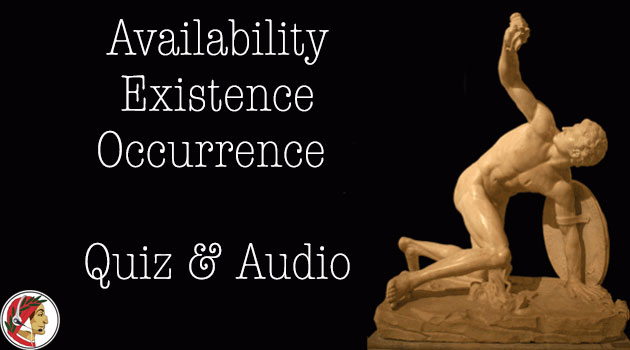Learn how to express availability, existence and occurrence in Italian with a quiz and audio examples
When we want to say that somethings is there, exists in Italian, we use CI and ESSERE combined together.
For example:
- Io ci sono. Tu ci sei?
- “Venite al concerto domani?”- “Sì, ci saremo”.
- Ieri al mercato c’erano un sacco di persone.
- Vorrei andare a Palermo, non ci sono mai stato.
If we want to describe the position of something or someone, we can use the reflexive verb trovarsi. It could be a situation, as in the third example.
- “Dove ti trovi?” – “Mi trovo al supermercato”.
- La farmacia si trova in Piazza Dante, vicino al panificio.
- Mi trovo in un mare di guai.
Do you understand the last one? If not, we can talk about that in class, on Skype.
We can use the notion of “to be present” with a different nuance, as to be physically in a place.
Essere presente
- Alla festa erano presenti 35 persone.
- La polizia è presente sulle strade per aiutarci.
- Gli amici sono presenti quando servono davvero.
- Non ero presente all’ultima lezione.
When something occurs, happens, takes place, we can use a few different words and verbs.
The verbs accadere, capitare and succedere mean “to happen”, with slightly different functions. Capitare in particular, means that something happens by chance.
Succedere is arguably the most common of the three while accadere is rather formal. They are all impersonal verbs, since they don’t have a precise subject (in English “it” happens, in Italian also “they happen”).
- Mi succede spesso di dimenticare le chiavi.
- L’anno scorso sono successe un sacco di cose nuove.
- La settimana scorsa ci è capitato di vedere l’arcobaleno.
- Ti capita mai di dimenticare i sogni?
- Non mi accade mai di trovare dei soldi.
- Certe cose non accadono mai per caso.
Capito?
There are other verbs closer to the English “to take place”, usually describe events.
Svolgersi is a reflexive verb, literally “to unfold”, but meaning to “take place”. Tenersi, another reflexive verb, and clarifies when or where an event “is held”. Avere luogo is the closest translation of “take place” (lit. “to have place”). Ricorrere is “to recur”.
Please note that occorrere in Italian means “to be necessary”. The use of occorrere as “to occur” is obsolete. It’s a classic false friend.
- La riunione si svolgerà all’Hotel Hilton di Torino.
- La manifestazione si è svolta senza incidenti.
- Ieri si è tenuto lo sciopero dei mezzi a Napoli.
- Il mese prossimo si terrà un concerto in onore del Presidente.
- A Roma hanno avuto luogo i più importanti eventi della storia italiana.
- La premiazione avrà luogo subito dopo la gara.
- Il quattro luglio ricorre l’anniversario dell’indipendenza americana.
When we want to express availability in Italian, we can use different adjectives (+ verbo essere) and verbs.
Common adjectives are for example essere + … disponibile (available), libero (free), occupato (occupied / busy), scarso (scarse), impegnato (busy), finito (finished).
Among verbs, of course we have avere, but also rimanere (to remain / left over) and the expressions with the pronoun ne (some of / part of).
- Il nuovo album di Jovanotti è disponibile su iTunes.
- Scusi, questa sedia è libera? – No, è occupata.
- In estate, l’acqua in questo lago è scarsa.
- Per caso sei disponibile oggi pomeriggio? – Mi dispiace, sono impegnato.
- Il pane è finito. Vado a comprarne un po’.
- Quanti figli avete? Ne abbiamo due.
- Per caso è rimasta della torta? – Sì, ce ne sono due fette in frigorifero.
By now you should be able to express availability, existence and occurrence in Italian. If you need more guidance, book a Skype trial class with me.
Solve the quiz and check your final score.
Alla prossima.
LOADING QUIZ...


